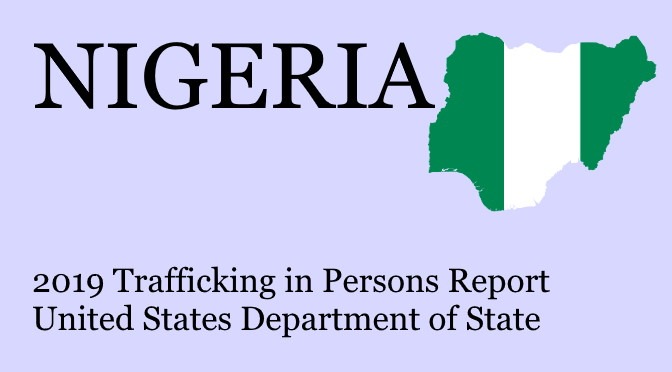
As reported over the past five years, human traffickers exploit domestic and foreign victims in Nigeria, and traffickers exploit victims from Nigeria abroad. Nigerian trafficking victims are recruited from rural areas and, to a lesser extent, urban areas. Women and girls are victims of domestic servitude and sex trafficking, and boys are victims of forced and bonded labor in street vending, domestic service, mining, stone quarrying, agriculture, textile manufacturing, and begging. In southern Nigeria, especially Lagos, some women drug and “rent” their infants out to street beggars to increase the beggars’ profits; in at least one case, an infant died from a drug overdose.
Nigerian traffickers take women and children to other West and Central African countries—including Mali, Senegal, Cote d’Ivoire, and Cabo Verde—as well as to South Africa, where they are exploited in forced labor and sex trafficking. Nigerian women and children are recruited and transported to destinations in North Africa, the Middle East and Central Asia, and exploited in sex trafficking or forced labor. West African children are subjected to forced labor in Nigeria, including in mines. Women from West African countries transit Nigeria en route to Europe and the Middle East, where traffickers force them into commercial sex.
Historically, the majority of Nigerian trafficking victims in Europe have come from Edo State, via Libya. One local press report noted that traffickers recruit women and girls from IDP camps in Northeast Nigeria for ostensibly legitimate jobs in Italy but exploit them in prostitution in Italy. Nigerian sex traffickers operate in highly organized criminal webs throughout Europe, and many sex trafficking victims begin to work for their traffickers in exchange for leaving sex trafficking themselves. Before departure for work abroad, many Nigerian women participate in a traditional ceremony with a juju priest; some traffickers exploit this tradition and tell the women they must obey their traffickers or a curse will harm them, which prevents victims from seeking assistance or cooperating with law enforcement.
In March 2018 the Oba of Benin—the most powerful religious ruler in Benin City—issued a curse on sex traffickers and revoked all juju spells that had been administered by priests to bind victims to their traffickers.
While some sex trafficking victims arrive in Europe believing they will be working in prostitution, traffickers coerce them to stay in prostitution by changing the working conditions and increasing victims’ travel debts. Some victims’ parents encourage them to obey their traffickers and endure exploitation to earn money. Nigerians are exploited in Libya—by both Libyans and Nigerians—in forced labor in construction, agriculture, and prostitution in Tripoli, Sabha, Benghazi, and Misrata. Lured by the promise of reaching Europe, traffickers keep victims in “control houses” or “prostitution camps” located on the outskirts of Tripoli and Misrata until they can repay travel debts; sometimes before victims repay the debt, traffickers sell them again.
Some trafficking victims in Libya reported Nigerian embassy officials in Tripoli asked for payment before removing victims from Libyan detention camps. Between April and November 2018, an international organization repatriated 3,160 Nigerians from North Africa, 80 percent of whom were repatriated from Libya.
ISIS has captured Nigerian women and girls in Libya and exploited them in sexual slavery. Criminal gangs – some of whom might have had ties to so-called student cults – partner with organized crime networks to transport Nigerians to Europe for exploitation. As in past years, reports continue to indicate government officials and security forces commit widespread sexual exploitation.
As media previously reported, there were continued reports that camp officials and members of security forces, including some individual Nigerian military personnel, used fraudulent or forced marriages to exploit girls in sex trafficking. Some Nigerian military personnel and CJTF members promised female IDPs jobs but instead took them to military barracks for sexual exploitation by Nigerian military personnel. Various NGOs and news outlets report that children in IDP camps are victims of labor and sex trafficking, and some alleged that government officials managing the camps are complicit in these activities.
Boko Haram and ISIS-WA continued to forcibly recruit, abduct, and use child soldiers as young as 12-years-old as cooks, spies, messengers, bodyguards, armed combatants. The groups continue to abduct women and girls in the northern region of Nigeria, some of whom they subject to domestic servitude and forced labor. Boko Haram routinely forces girls to choose between forced marriages to its fighters—for the purpose of sexual slavery—or becoming suicide bombers. In some cases, Boko Haram forced child soldiers to marry one another.
Contrary to Nigerian law, the government continued to arrest and, in some cases, detain for prolonged periods, reportedly for screening and perceived intelligence value, women and children removed from or allegedly associated with Boko Haram and ISIS-WA, including women and girls who had been forcibly married to or sexually enslaved by the insurgents.
Adapted from TIP 2019 by the U.S. Department of State

